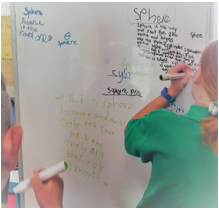Posted Friday, 19 July 2024
Space rocket debris lands at Scitech
The new exhibit featuring a piece of an Indian space rocket will be inspiring Scitech visitors to learn more about science …
My name is Leanne Summers. In 2022 I was coached in the Lighthouse Maths Program. This year I have had the privilege of developing my understanding of this very powerful program further through my role as a Lighthouse Maths coach for Scitech, and with my colleagues at Bindoon Primary School where I teach.

If I had a dollar for every time I heard – evidence-based, risk-taking, safe environment, engaging, hands-on, cooperative, autonomous, differentiated and most recently high-impact teaching – I would be a millionaire. In an ideal world, or in this case an ideal classroom, it would be easy to construct and implement lessons considering all of these. In the Lighthouse Maths Program, I have learned that all of this is possible in each and every Lighthouse lesson. Sounds like the magic ticket, doesn’t it?
The Lighthouse Maths Program has enabled me to do this because it is an evidence-based, best-practice program that uses the power of productive struggle, discussion to promote deep understanding, and wider connection through cooperative problem-solving.
As teachers we are told that most students can develop strong numeracy knowledge and understanding. Lighthouse Maths lessons have reinforced this for me. In these lessons, the teacher sets a problem and then steps back and observes the students as they begin to engage with the problem in small groups. If any group is struggling to get started, the teacher provides a prompt that gives them just enough information to enable them to begin.
This may be a visual prompt, a reduced task, or they may be guided using questioning. This process allows the students to take control and solve the problem any way they choose. We don’t encourage or discourage any method, which enables the students to be creative and try out different methods in a safe environment. This also provides natural differentiated lessons because the students work on the problems at their own level. Over the past two years, I have seen many typically disengaged students, who struggle, zone out, or shut down in ‘traditional’ maths lessons, seem like completely different students in Lighthouse lessons. They are highly engaged and make complaints when the lesson needs to end because they don’t want to stop until they find the solution(s).
Let’s face it, maths scares some teachers. So, if it is difficult for the teacher, imagine how daunting it could be for some of the students. I have seen reluctant students develop into willing and confident mathematicians who are willing to take risks in their learning and are no longer afraid of making mistakes.
Lighthouse lessons, or more specifically, Powerful Problem-Solving (PPS) lessons, are very versatile. They can be used to introduce a topic in the middle of a unit of work, at the end for assessment, or as a standalone lesson. They also provide the means for developing and assessing the reasoning part of the curriculum.
During the planning process, the teacher designs a clear lesson goal suited to the needs of the students. This goal is evident in all aspects of the plan, and it is the teacher’s focus throughout the lesson. This enables the teacher to guide the students through carefully selected questioning towards the desired understandings. It provides multiple opportunities for meaningful dialogue with the students. The following conversation I had with a student highlights this:
Student: ‘It feels like you are interrogating us, but in a good way.’
Me: ‘Tell me more, what do you mean?’
Student: ‘Well… you ask me lots of questions and it helps me to understand the maths better!’
In Lighthouse lessons, I have witnessed some very unexpected thinking from the students. This highlights the interconnectedness of maths ideas and gives the teacher a fantastic insight into students’ understandings and their approaches. Here is just one example:
After finding all solutions to a problem, a Year 3 student started to delve into negative numbers – the teacher had no idea she even knew what they were.
This type of information is rarely discovered in a traditional maths lesson. It provides the teacher with invaluable information about the students and enables teachers to cater future lessons to meet the learning needs of these students. Lighthouse Maths lessons can achieve amazing things!
If you are interested in becoming involved in this fully funded program, don’t hesitate to submit an application for 2024.
Upon clicking the "Book Now" or "Buy Gift Card" buttons a new window will open prompting contact information and payment details.